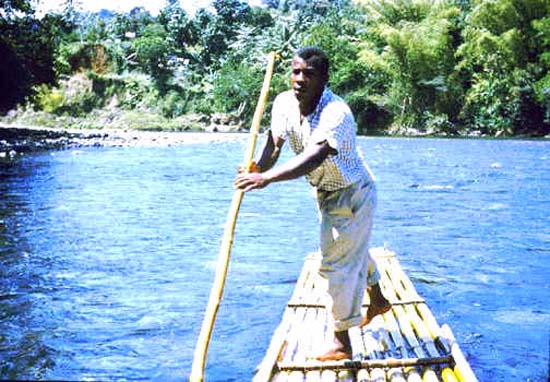
The Peace Corps - giving to Jamaica for 42 years
The Peace Corps - giving to Jamaica for 42 years
JIS News
Wednesday, April 21, 2004
A file photo of Peace Corps volunteers at work in Jamaica. (file: photo)
After completing college, 28-year old American and Peace Corps volunteer David White had a burning desire "to give back" some of the rewards he had earned, having been granted a tertiary education. His way of "giving back" came with his decision to enrol in the Peace Corps, a voluntary organisation that addresses the human needs of persons in developing countries.
He tells JIS News that working with the Peace Corps of Jamaica for the past five years has been a fulfilling experience that "has changed my life".
When he arrived in Jamaica in 1999, White, who has harboured an interest in Caribbean culture, was assigned to live with a host family in southern Trelawny, where he was to work on a sanitation and water project.
Loois. volunteers are carefully selected
"I worked in areas where most communities didn't have running water," he recalls, "so we worked on projects which helped to create more sanitary water supplies."
In addition to the project's provision of running water, he says, "We did a large project trying to put in new types of compost toilet units for personal use."
For White, living and working in rural Jamaica was challenging. While, for the most part, the development work the Peace Corps carries out is not "physically hard labour, motivating people (which is one of the organisation's main goals) can be challenging", he explains.
According to White, one of the hindrances he has identified working in the voluntary service in Jamaica is the perception by members of communities that "development workers are not looking out for the best interest of the community".
"At the same time, you find people who are willing to open and expose themselves to take a risk, to put in extra work and convince their community members that through cooperation, unity and togetherness, they can produce a change in their environment," he says of others.
Making positive changes has been an important aspect of the work of the Peace Corps in Jamaica for the last 42 years.
The voluntary agency's long stint in Jamaica took effect on February 22, 1962 when Norman Washington Manley signed an agreement with the United States Government, inviting the Peace Corps to launch a programme in the island. Later in that year, on June 12, the first group of 37 volunteers arrived in Jamaica after training in San Diego. The volunteers journeyed to the island mere weeks before Jamaica ushered in its independence, coming to work in the fields of agricultural and vocational education, formal education, construction, electricity, plumbing, library and health. Since then, more than 3,400 volunteers have been sworn in to serve in Jamaica, which is one of 134 countries across the world to which Peace Corps volunteers have been dispatched to work.
The Peace Corps was established as an agency by an executive order of President John F Kennedy on March 1, 1961. In June of the same year, the US Congress approved the legislation formally authorising the Corps, giving it a mandate to promote world peace and friendship.
Peace Corps country director for Jamaica, Suchet Loois, explains to JIS News that the agency revolves around three main goals - development of the host country, the promotion of a better understanding of Americans within the host country, and for volunteers to get a better understanding of the people of the host country.
A key component to the success of the varied programmes of the Peace Corps is community integration which, Loois says, is critical as it sets the framework for the volunteers to maintain ongoing interaction with community members.
"In order to improve the quality and sustainability of the Peace Corps work in the country, the volunteers have to meet that goal (community integration)," he states.
"Every volunteer that comes to Jamaica has to be assigned to a community or organisation to fulfil community-based training where our volunteers spend five of seven weeks in training, living with a host family where they can learn about the family and also Jamaican culture."
According to Loois, volunteers are carefully selected and more often than not, are tertiary school graduates. Volunteers range in age from their twenties to early sixties.
Loois says that presently, the Peace Corps in Jamaica is focusing its work on three sectors: environmental awareness, youth development and community environmental health.
While many volunteers often implement or help in the implementation of development projects, they mainly fulfil their tasks by working in established government, non-governmental and community-based organisations.
Loois is of the view that the most significant achievement of the Peace Corps has been the mobilisation of "human power into several fields of development".
He credits the sustained presence of the Peace Corps in the island to a fairly stable political system, and the emerging needs of the country as it continues to develop.
Looking to the future of the Peace Corps in Jamaica, Loois says the agency is positioning itself to extend its service to the island as well as increase its voluntary workforce to number more than 200 persons.
This is in keeping with United States president, George W Bush's promise to double the number of Peace Corps volunteers worldwide by 2007.
